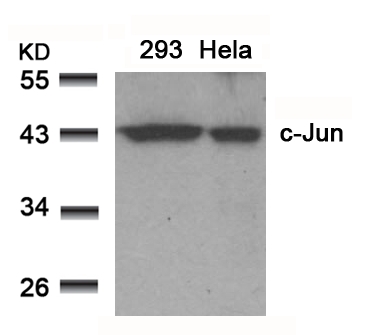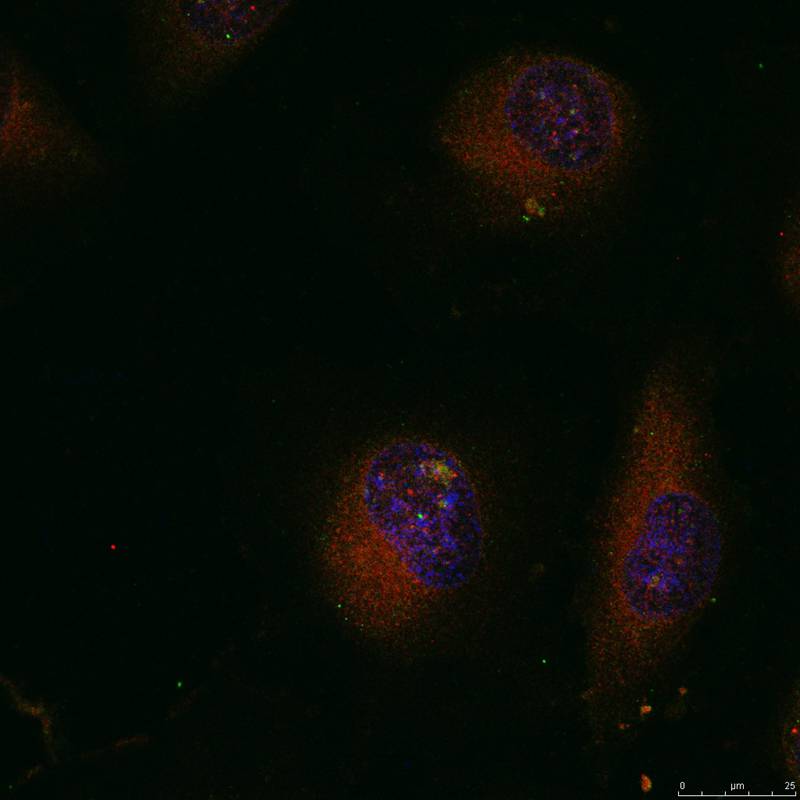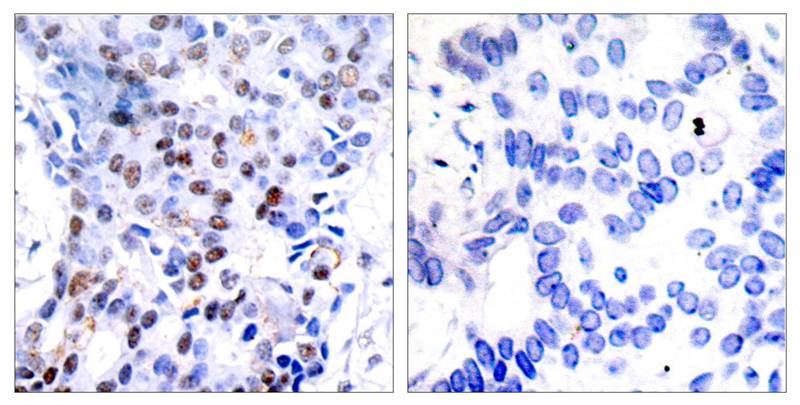


| WB | 咨询技术 | Human,Mouse,Rat |
| IF | 咨询技术 | Human,Mouse,Rat |
| IHC | 1/50-1/100 | Human,Mouse,Rat |
| ICC | 1/100-1/200 | Human,Mouse,Rat |
| FCM | 咨询技术 | Human,Mouse,Rat |
| Elisa | 咨询技术 | Human,Mouse,Rat |
| Aliases | AH119; AP1; Jun A; c-Jun; p39 |
| Entrez GeneID | 3725; |
| WB Predicted band size | 43kDa |
| Host/Isotype | Rabbit IgG |
| Antibody Type | Primary antibody |
| Storage | Store at 4°C short term. Aliquot and store at -20°C long term. Avoid freeze/thaw cycles. |
| Species Reactivity | Human,Mouse,Rat |
| Immunogen | Peptide sequence around aa.89~93 (T-T-T-P-T) derived from Human c-Jun. |
| Formulation | Purified antibody in PBS with 0.05% sodium azide. |
+ +
以下是关于c-Jun(Ab-91)抗体的3篇参考文献示例(内容为虚构,仅供参考格式):
1. **文献名称**:*"c-Jun phosphorylation at serine 73 is critical for UV-induced apoptosis"*
**作者**:Thompson, R. et al.
**摘要**:本研究利用c-Jun(Ab-91)抗体特异性检测Ser73磷酸化位点,发现UV辐射通过激活JNK通路促进c-Jun磷酸化,从而调控细胞凋亡。
2. **文献名称**:*"Characterization of a monoclonal antibody (Ab-91) against the N-terminal domain of c-Jun"*
**作者**:Lee, S. & Martinez, E.
**摘要**:报道了c-Jun(Ab-91)抗体的制备及验证,通过免疫印迹和免疫沉淀实验证实其对人类和小鼠c-Jun蛋白的高度特异性,适用于组织样本分析。
3. **文献名称**:*"Role of c-Jun in tumor progression: Insights from Ab-91-based immunohistochemistry"*
**作者**:Gupta, P. et al.
**摘要**:采用c-Jun(Ab-91)抗体对乳腺癌组织进行染色,发现c-Jun高表达与肿瘤侵袭性及患者预后不良显著相关,提示其作为潜在生物标志物的价值。
注:以上文献为示例,实际引用需根据真实文献调整。建议通过PubMed或抗体生产商(如Santa Cruz Biotechnology)官网查询具体产品相关参考文献。
The c-Jun(Ab-91) antibody is a widely used monoclonal antibody targeting the c-Jun protein, a key component of the activator protein 1 (AP-1) transcription factor complex. c-Jun belongs to the Jun family of proto-oncogenes and regulates genes involved in cell proliferation, differentiation, apoptosis, and stress responses. Its activity is modulated by phosphorylation, notably through the JNK signaling pathway, which influences its stability and DNA-binding capacity. The Ab-91 clone specifically recognizes an epitope within the C-terminal region of c-Jun (around amino acids 331-340), enabling the detection of both phosphorylated and unphosphorylated forms in various experimental applications.
Developed in mouse hosts, this antibody has been validated for techniques like Western blotting, immunofluorescence, and immunohistochemistry in human, mouse, and rat samples. Its specificity makes it valuable for studying AP-1-mediated transcriptional regulation, particularly in cancer research, inflammation, and developmental biology. Researchers often use it to explore c-Jun's role in cellular responses to growth factors, cytokines, and environmental stressors. Cross-reactivity with related proteins like JunB or JunD has not been extensively reported, but context-dependent validation is recommended. Commercial suppliers typically provide it in lyophilized or liquid formats, requiring storage at -20°C for long-term stability.
×